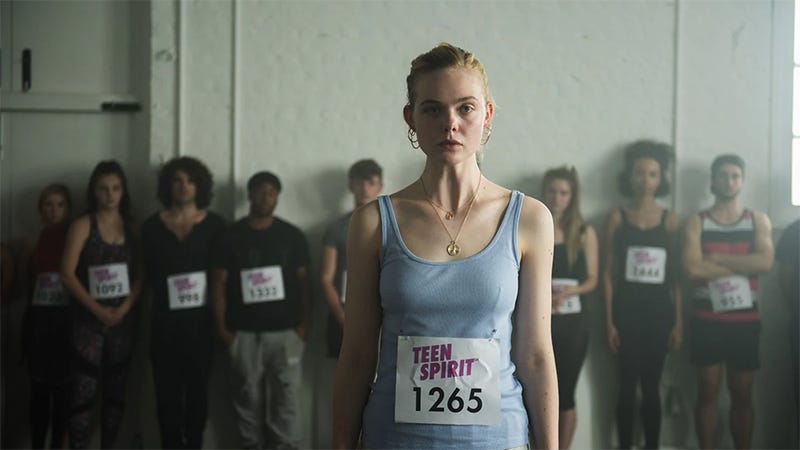Teen Spirit

I'm a firm believer that there is still value in telling a story through a tried-and-true structure, even one largely supported by familiar plot beats. Film is a exceptionally expressive medium, given its many composited elements, and filmmakers can find other routes than plot to create a unique, meaningful experience for the viewer.
Throughout the first act, this was the sense I was getting from Teen Spirit: a familiar Cinderella story (a quiet girl living a modest and boring life enters a nationally televised singing competition) made different by understated performances, careful editing and photography choices, and an arthouse flair for emotional distance and quiet. The characters seemed cold and hollow at first, though that's been a popular stylistic approach in recent years; perhaps the aim was to allow me, the viewer, to more easily slip into the skins of the film's main characters, unburdened by clearly defined character traits that might separate us early on. Unfortunately, Teen Spirit never really takes the opportunity to fill in the emptiness of its characters with growth, change, or even clear motivation.
Our protagonist, Violet Valenski (Elle Fanning), seems to hate her boring, lonely life, cooped up in a secluded house and constantly at odds with her single mother. But she likes to sing, and occasionally slips out of an evening to croon to the drunken, uninterested patrons at a nearby pub for pocket money. Her mother classically doesn't approve of Violet's lofty passion, and discourages her from going out or pursuing singing at all. After one pub performance, Violet meets a haggard Russian man named Vlad (Zlatko Buric) who claims to be a former opera singer. When word comes round that a national singing competition (called "Teen Spirit") was holding open auditions, Violet asks Vlad to stand in as her guardian, since she knows her mother wouldn't even let her enter, let alone go with her as a sponsor. Vlad agrees on the condition that he become her manager and receive a portion of her earnings if she makes it big. Violet agrees, and the two set to work preparing for the competition.
From there, the film proceeds pretty much as expected (remember, "familiar Cinderella story"). But the journey from pub singer to TV sing-off contestant is where director Max Minghella lost me; rather than having the patience to show us Violet's emotional journey, Minghella executes the majority of it in flashy musical montage. Even her first round auditions, which I imagine would have been a harrowing step for someone as timid and reserved as Violet to take, is done in a 90-second dialogue-less music video... in which we see precisely none of the reasons why Violet was chosen over anyone else. Sure, we know she has a good voice from her performances in the pub, but we don't see how she fares comparatively to the dozens (perhaps hundreds) of other contestants at her audition.
Similarly, we also aren't really shown how Violet improves or changes her techniques in order to become a better contender over the course of the film. She's a great singer when she starts, and she's great at the end. The film even makes a point to have judges tell her what she needs to improve on, and I guess she kind of does, but we don't get to see the period of growth or her struggle to do so.
Likewise, Violet doesn't really change as a person either; she goes through a brief phase of being an unreasonable, self-absorbed jerk during her rise to stardom (classic). Otherwise, she's a quiet, emotionally distant person at the start and at the end. There's a scene late in the film in which Violet is asked, "Why did you enter this competition?" Violet's answer is, "I like to sing," and I'm sure that was intended to be a display of her modesty and lack of self-assurance. But after spending an hour and fifteen minutes with a stagnant, undefined protagonist, the line played more like a perfect distillation of the film: a story that has no idea what it wants to say about its empty, aimless main character.
Fortunately, at least the musical sequences are killer. Cinematographer Autumn Durald's background in music videos is apparent; the kinetic lighting and dramatic staging bolster each performance with all the energy you could ask for. Even when they feel unearned as key emotional beats in Violet's story, they work in isolation as epic depictions of a quiet girl releasing her inner badass on stage. Fanning absolutely kills the vocals, by the way; I think I like all of her renditions on the film's pop soundtrack more than the originals.
Teen Spirit is definitely not a bad film; Fanning's performance as Violet is compelling enough, at least superficially, to keep your eyes on screen. But the film's severe lack of definitionn—not only in its protagonist's characterization, but in that of all of the supporting cast—will prevent most from becoming emotionally attached to Violet's journey. If it's worth seeing, it's only for the gorgeously shot and edited musical sequences and Fanning's vocal performance. Otherwise, Teen Spirit is just a pretty picture of a boring person.
https://www.youtube.com/watch?v=z_Sqi-ashvU&w=585



